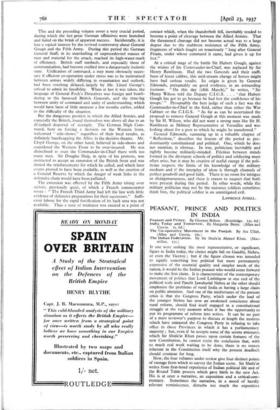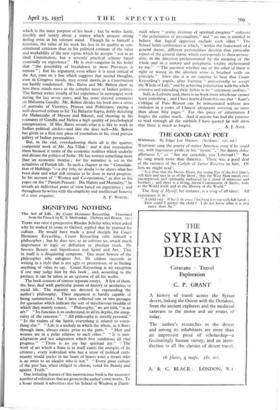PEASANT , PRINCE AND POLITICS IN INDIA
Peasant and Prince. By Glorney Bolton. (Routledge. Its. 6d.) India Today and Tomorrow. By Margarita Barns. (Allen and Unwin. 7s. 6d.) The Co-operative Movement in the Punjab. By Ata Ullah. (Allen and Unwin. i6s.) The Indian Federation. By Sir Shafa'at Ahmad Khan. (Mac- millan.
IF one were seeking the most representative, or significant, figure in India today, the choice might fall on Gandhi, Nehru,
or even the Viceroy ; but if the figure chosen was intended to signify something less political but more permanently expressive of the essential quality and simpler needs of the nation, it would be the Indian peasant who would come forward to make the first claim. It is characteristic of the contemporary movement of politics that Lord Linlithgow at one end of the political scale and Pandit Jawaharlal Nehru at the other should emphasise the problems of rural India as having a large claim on public attention. And one of the misfortunes of the present crisis is that the Congress Party, which under the lead of the younger Nehru has now an -awakened conscience about rural reform, should find itself engaged in a constitutional struggle at the very moment when it has the opportunity to put its programme of reform into action. It can be no part of a mere reviewer's purpose to discuss at length the motives which have animated the Congress Party in refusing to take office in those Provinces in which it has a parliamentary majority ; but, even if he accepts some of the severe strictures which Sir Shafa'at Khan passes upon certain features of the new Constitution, he cannot resist the conclusion that, with so much real work waiting to be done, there is no reason inherent in the Constitution itself why the present deadlock should continue for long.
Now, the four volumes under review give four distinct points of vantage from which to survey the Indian scene. Sir Shafa'at writes from first-hand experience of Indian political life and of the Round Table process which gave birth to the new Act. His is at once a narrative, an exposition and a critical com- mentary. Sometimes the narrative, in a mood of hardly relevant reminiscence, disturbs too much the exposition which is the main purpose of his book ; but he writes fairly, forcibly and sanely about a matter which arouses strong feeling even in his tolerant mind. Though he is himself a historian, the value of his work lies less in its quality as con- stitutional criticism than in his political estimate of the value and workability of the new regime which he accepts " not as an ideal Constitution, but a severely practical scheme based essentially on experience." He is over-sanguine in his belief that " the possibility of breakdown in most Provinces is remote " ; but his argument, even where it is most critical of the Act, runs on a line which suggests that second thoughts, even in Congress minds, may reveal merits in a Constitution too hastily condemned. Mrs. Barns and Mr. Bolton show us how these minds move in the complex maze of Indian politics. The former writes vividly of her experience in newspaper work during the last seven years, and has some shrewd comments on Mahatma Gandhi. Mr. Bolton divides his book into a series of portraits of Viceroys, Princes and Politicians, paying a well-deserved tribute to Sir Tej Bahadur Sapru, deftly sketching the Maharajahs of Mysore and Bikanir, and showing in his estimates of Gandhi and Nehru a high quality of psychological interpretation. If Mrs. Barns reveals what it is like to work in Indian political circles—and this she does well—Mr. Bolton has given us a first-rate piece of journalism in his vivid picture gallery of Indian personalities.
But, in the end, overshadowing them all is the quieter, competent work of Mr. Ma Ullah : and it does overshadow them because it treats of the economic realities which underlie and dictate the politics of India. He has written something more than an economic treatise ; for his narrative is set in the actualities of Punjab life. In such a chapter as the " Consolida- tion of Holdings "—a dry title, no doubt !—he shows what has been done and what still remains to be done in rural progress. In his account of " Women and Co-operation," as also in his pages on the "Punjab Peasant : His Habits and Mentality," he reveals an individual point of view based on experience ; and throughout he writes with the simplicity and intellectual honesty











































 Previous page
Previous page